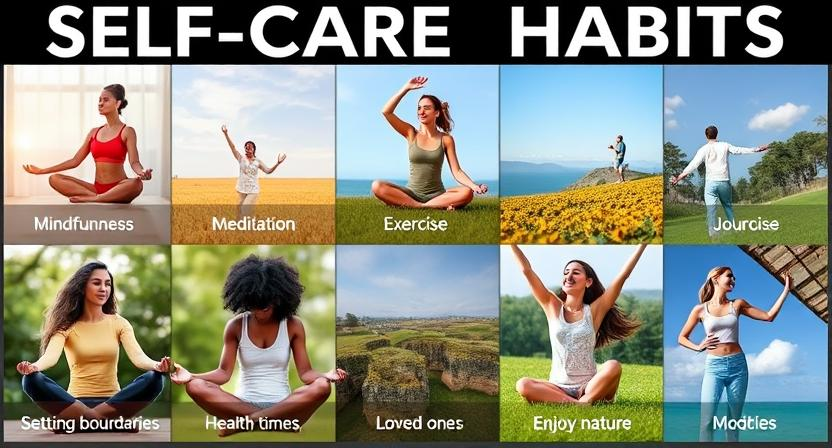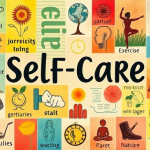
Self-Care Chronicles: Top 7 Habits to Boost Your Emotional Well-Being
Habits for a Healthy Mind

Creating a routine that incorporates regular exercise, nutritious meals, and sufficient sleep can significantly contribute to a healthy mind. Physical activity not only improves mood and cognitive function but also reduces stress and anxiety. A well-balanced diet rich in fruits, vegetables, whole grains, and lean proteins provides essential nutrients that support brain health and overall well-being.
In addition to physical health, mental well-being can be nurtured through practices such as meditation, journaling, or deep breathing exercises. Taking time each day to engage in activities that promote relaxation and mindfulness can help reduce feelings of overwhelm and enhance mental clarity. Making time for hobbies and interests that bring joy and fulfillment is also crucial for a healthy mind.
Prioritizing Your Mental Health
Prioritizing your mental health is essential for overall well-being. Making self-care a non-negotiable part of your daily routine can significantly improve your emotional resilience and ability to cope with life’s challenges. Taking time to check in with yourself, engage in activities that bring you joy, and practicing mindfulness can all contribute to a healthier mindset.
Additionally, setting boundaries in your personal and professional life is crucial for protecting your mental health. Learning to say no when necessary, advocating for your needs, and surrounding yourself with supportive individuals can help create a positive and nurturing environment that promotes emotional wellness. Remember, prioritizing your mental health is not selfish, but rather a proactive step towards leading a happier and more fulfilling life.
Creating a Calming Routine
In the midst of life’s chaos and demands, establishing a calming routine can provide a sense of stability and peace. By incorporating activities that promote relaxation and mindfulness into your daily schedule, you can create a soothing environment for your mind and body to unwind. This routine could include practices such as gentle yoga, deep breathing exercises, or taking a leisurely evening walk to clear your mind.
Additionally, incorporating calming activities like reading a book, listening to soft music, or sipping on a warm cup of tea before bed can signal to your brain that it’s time to wind down and prepare for rest. Consistency is key when it comes to establishing a calming routine, so try to create a daily schedule that allows for moments of tranquility and self-care. By prioritizing these moments of relaxation, you can cultivate a sense of inner peace and balance amidst life’s inevitable stressors.
Mindfulness Practices for Emotional Well-Being
Mindfulness practices involve bringing your full attention to the present moment without judgment. This can help you stay grounded in reality and prevent unnecessary stress from overwhelming you. By focusing on your breath, bodily sensations, or surroundings, you can cultivate a sense of calmness and clarity in the midst of emotional turmoil.
Engaging in mindfulness meditation for even just a few minutes a day can have a profound impact on your emotional well-being. This practice allows you to observe your thoughts and feelings without being carried away by them, giving you the space to respond thoughtfully rather than react impulsively. Over time, mindfulness can help you develop a greater sense of self-awareness and emotional resilience, enabling you to navigate life’s challenges with greater ease.
• Mindfulness practices involve bringing your full attention to the present moment without judgment.
• This can help you stay grounded in reality and prevent unnecessary stress from overwhelming you.
• By focusing on your breath, bodily sensations, or surroundings, you can cultivate a sense of calmness and clarity in the midst of emotional turmoil.
Engaging in mindfulness meditation for even just a few minutes a day can have a profound impact on your emotional well-being.
• This practice allows you to observe your thoughts and feelings without being carried away by them
• Giving you the space to respond thoughtfully rather than react impulsively.
Over time, mindfulness can help you develop a greater sense of self-awareness and emotional resilience
Enabling you to navigate life’s challenges with greater ease.
Setting Boundaries for Self-Care

Setting boundaries is a crucial aspect of self-care that often gets overlooked. It is essential to establish limits and communicate them clearly to others to protect your mental and emotional well-being. Setting boundaries can involve saying no to additional responsibilities when you are already feeling overwhelmed, or letting others know when certain behaviors are not acceptable to you. When you respect your own boundaries, you are prioritizing your needs and showing yourself the care and respect you deserve.
By setting boundaries, you are creating a safe and healthy space for yourself to thrive. Boundaries help prevent burnout, reduce feelings of resentment, and promote a sense of empowerment and self-worth. It is important to remember that setting boundaries is not selfish, but rather an act of self-preservation that allows you to show up as your best self in all areas of your life. Take the time to assess where you need to establish boundaries and begin implementing them gradually for a more balanced and fulfilling life.
Nurturing Positive Relationships
Positive relationships play a crucial role in our emotional well-being. Surrounding ourselves with supportive and caring individuals can uplift our spirits and provide a sense of belonging. Whether it’s spending quality time with family members, catching up with friends over a cup of coffee, or simply sharing a laugh with a colleague, these interactions can bring joy and fulfillment to our lives.
Communication is key in nurturing positive relationships. Ensuring open and honest dialogue allows for understanding, empathy, and connection to flourish. Taking the time to listen attentively, express appreciation, and validate the feelings of others can strengthen bonds and foster trust. By prioritizing effective communication, we can cultivate deeper, more meaningful connections that enrich our emotional health.
The Power of Gratitude in Emotional Wellness
Gratitude is a powerful tool that can significantly impact our emotional well-being. When we cultivate a mindset of gratitude, we shift our focus from what is lacking to what we already have in our lives. This shift in perspective enables us to appreciate the present moment and find joy in the simple things that we may often take for granted.
Expressing gratitude also fosters a sense of connection and positivity in our relationships. By acknowledging and thanking those around us for their support, kindness, or presence, we strengthen our bonds with others and create a more supportive and uplifting environment. Additionally, practicing gratitude can counteract negative emotions and stress, promoting a more balanced and resilient mental state.
Finding Joy in Everyday Moments
Embracing the simplicity and beauty of everyday moments can significantly enhance our emotional well-being. Taking the time to notice and appreciate small pleasures like a sunrise, a warm cup of tea, or a heartfelt conversation with a loved one can bring a sense of joy and gratitude to our lives. These moments may seem insignificant at first glance, but they have the power to uplift our spirits and remind us of the goodness that surrounds us each day.
In a world that often feels fast-paced and chaotic, finding joy in everyday moments can serve as a grounding force, helping us stay present and mindful. By intentionally seeking out moments of joy, whether it’s savoring a delicious meal or relishing a moment of laughter with friends, we cultivate a positive mindset and foster a greater sense of happiness in our daily lives. Finding joy in the ordinary can lead to a more fulfilling and meaningful existence, reminding us to appreciate the small wonders that make life truly special.
Managing Stress Through Healthy Habits

Stress is an inevitable part of life, but how we manage it can significantly impact our emotional well-being. Engaging in healthy habits is key to effectively coping with stress. Regular exercise has been shown to reduce cortisol levels, the hormone associated with stress, and release endorphins that elevate mood. Ensuring adequate sleep is also crucial in regulating stress levels, as lack of sleep can exacerbate stress and weaken our ability to cope with challenges.
In addition to physical health, maintaining a balanced diet plays a vital role in managing stress. Consuming a variety of nutrient-rich foods can support our body in combating the negative effects of stress. Avoiding excessive caffeine, sugar, and processed foods can help stabilize mood and energy levels, reducing the impact of stress on our emotional well-being. Prioritizing healthy eating habits can provide the necessary fuel for our body and mind to navigate stress more effectively.
Embracing Vulnerability and Authenticity
Vulnerability and authenticity are essential components of emotional well-being. When we allow ourselves to be vulnerable, we open ourselves up to deeper connections with others. This openness and honesty create a sense of authenticity in our relationships, fostering trust and intimacy. By embracing vulnerability, we acknowledge our true selves and are more likely to attract genuine connections that uplift and support us.
Authenticity is about being true to ourselves and our values, even when faced with challenges or temptations to conform. When we embrace our authentic selves, we cultivate a sense of inner peace and alignment. By staying true to our beliefs and emotions, we can navigate life’s ups and downs with resilience and grace. Embracing vulnerability and authenticity empowers us to live courageously and wholeheartedly, embracing our imperfections and celebrating our uniqueness.
Cultivating a Growth Mindset
When cultivating a growth mindset, it is essential to embrace challenges as opportunities for learning and growth. Viewing setbacks as temporary obstacles rather than insurmountable roadblocks can shift your perspective towards continuous improvement. By approaching new experiences with curiosity and a willingness to learn from them, you can develop resilience and adaptability in the face of adversity.
Moreover, adopting a growth mindset involves acknowledging and accepting constructive feedback as a means to enhance your abilities and skills. Instead of feeling discouraged by criticism, strive to see it as valuable input that can guide your personal and professional development. Embracing a mindset focused on progress and development can lead to increased motivation, creativity, and a willingness to take on new challenges with confidence.
Practicing Self-Compassion and Forgiveness
Practicing self-compassion involves treating oneself with kindness and understanding, especially in challenging times. By acknowledging and accepting our own imperfections and mistakes without harsh judgment, we can cultivate a sense of inner peace and self-acceptance. Forgiveness, both of oneself and others, can release the burden of resentment and anger that weighs heavy on the heart, allowing space for healing and growth.
Embracing self-compassion and forgiveness is essential for maintaining emotional well-being. It requires us to let go of self-criticism and negative self-talk, and instead, offer ourselves the same empathy and compassion we would give to a friend in need. By practicing forgiveness, we can free ourselves from the cycle of holding onto grudges and past hurts, opening ourselves up to a future filled with positivity and peace.
Engaging in Creative Outlets for Emotional Expression

Engaging in creative outlets for emotional expression can be a powerful way to process and release pent-up feelings. Whether it’s painting, writing, dancing, or playing music, these outlets provide a channel for emotions to be expressed in a safe and constructive manner. Through the act of creation, individuals can delve into their inner world, explore their thoughts and emotions, and gain insights into their subconscious mind.
Creativity allows for a sense of freedom and liberation, enabling individuals to tap into their authentic selves and connect with their emotions on a deeper level. By expressing emotions through creative means, individuals can experience a cathartic release, reducing feelings of stress and anxiety. This process of emotional expression through creativity not only promotes self-discovery and healing but also fosters a sense of empowerment and emotional well-being.
Connecting with Nature for Emotional Healing
Spending time in nature can have a profound impact on our emotional well-being. The sights, sounds, and smells of the natural world can help to calm our minds and reduce feelings of stress and anxiety. Whether it’s taking a walk in the park, sitting by a river, or simply enjoying the sunshine in a backyard, connecting with nature allows us to escape the daily pressures of life and find a sense of peace and tranquility.
Nature has a way of grounding us and bringing us back to the present moment. The beauty of the outdoors can inspire feelings of awe and gratitude, shifting our focus away from worries and negative emotions. By immersing ourselves in the natural world, we can gain perspective, clarity, and a renewed sense of energy and vitality.
Learning to Let Go of Negative Emotions
Learning to let go of negative emotions can be a transformative experience in improving emotional well-being. It involves acknowledging these feelings without judgment and then releasing them rather than suppressing or dwelling on them. Constantly holding onto negative emotions can take a toll on mental health, leading to increased stress, anxiety, and a sense of heaviness in daily life. By practicing techniques such as mindfulness, journaling, or talking to a trusted friend or therapist, individuals can gradually learn to release negative emotions and make room for more positive and enriching experiences in their lives.
It is essential to recognize that letting go of negative emotions is a process that takes time and practice. It requires a conscious effort to shift your focus from past grievances or anxieties about the future to the present moment. By being mindful of your thoughts and emotions, you can start to identify patterns that trigger negative feelings and work towards releasing them. Learning to let go of negative emotions is not about denying their existence but about understanding their impact and choosing to release their hold on your mental and emotional state.
Establishing a Support System for Emotional Support
Building a strong support system is essential for maintaining emotional well-being. Surrounding yourself with understanding and empathetic individuals can provide a sense of comfort and security during challenging times. Friends, family members, or support groups can offer listening ears, valuable advice, and a shoulder to lean on when needed most. Sharing your thoughts and feelings with trusted individuals can help alleviate stress and promote a sense of connection and belonging.
In times of emotional distress, having a support system in place can be a crucial lifeline. It is important to cultivate relationships that are based on mutual respect, trust, and genuine care for one another. By fostering these connections, you create a safe space where you can freely express yourself without fear of judgment or rejection. Remember, reaching out for support is not a sign of weakness but a testament to your willingness to prioritize your emotional well-being.
Balancing Work and Personal Life for Well-Being

When it comes to maintaining a sense of well-being, finding the right balance between work and personal life is crucial. In today’s fast-paced world, the boundaries between work and personal time can easily blur, leading to increased stress and burnout. It’s essential to prioritize self-care and establish clear boundaries to prevent work from overshadowing other aspects of your life.
One way to achieve a better balance is to set aside designated time for both work and leisure activities. By creating a structured schedule and sticking to it, you can ensure that you allocate enough time for work tasks while also carving out moments for relaxation, hobbies, and spending quality time with loved ones. Remember that a healthy work-life balance not only benefits your emotional well-being but also enhances your overall productivity and satisfaction in both areas of your life.
Investing in Rest and Relaxation
After a long day filled with work, responsibilities, and other obligations, it’s crucial to unwind and recharge your batteries. Allocating time for rest and relaxation is not a luxury but a necessity for emotional well-being. Whether it’s taking a leisurely bath, reading a book, or enjoying a peaceful walk in nature, finding activities that help you decompress and de-stress can significantly impact your overall mood and mental health.
By prioritizing rest and relaxation in your daily routine, you are giving yourself the opportunity to rejuvenate both physically and mentally. It allows you to step back from the hustle and bustle of daily life, giving your mind the much-needed break it deserves. Incorporating moments of calm and tranquility into your schedule can help you better manage stress, improve focus and concentration, and foster a more positive outlook on life.
Exploring Therapy and Counseling Options
Therapy and counseling can be valuable tools in managing and improving emotional wellness. Seeking the support of a professional therapist or counselor can provide a safe space to explore and process challenging emotions, thoughts, and experiences. These mental health professionals are trained to offer guidance, perspective, and coping strategies to help individuals navigate difficult situations and promote healing.
It is important to remember that therapy is a collaborative process, where open communication and trust are key. By actively engaging in therapy or counseling sessions, individuals can gain insights into their emotions and behaviors, develop healthier coping mechanisms, and work towards personal growth. Whether seeking therapy for specific issues or simply wanting to enhance emotional well-being, exploring therapy and counseling options can be a positive step towards self-care and introspection.
The Importance of Physical Health in Emotional Wellness
Physical health plays a crucial role in our overall emotional well-being. Engaging in regular physical activity not only benefits our bodies but also has a profound impact on our mental health. Exercise releases endorphins, often referred to as the “feel-good” hormones, which can help alleviate symptoms of anxiety, stress, and depression. Additionally, staying physically active can improve sleep quality, boost self-esteem, and provide a sense of accomplishment.
Incorporating a balanced diet into our daily routine is another essential component of maintaining good physical health for emotional well-being. Proper nutrition not only nourishes our bodies but also influences our mood and cognitive function. Consuming a variety of fruits, vegetables, lean proteins, and whole grains can help regulate blood sugar levels, increase energy levels, and improve overall well-being. Prioritizing healthy eating habits can contribute to a more stable emotional state and enhance our ability to cope with daily stressors.











